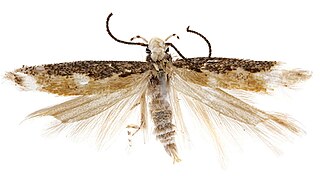
An artist is a person engaged in an activity related to creating art, practicing the arts, or demonstrating an art. The common usage in both everyday speech and academic discourse refers to a practitioner in the visual arts only. However, the term is also often used in the entertainment business, especially in a business context, for musicians and other performers. "Artiste" is a variant used in English in this context, but this use has become rare. Use of the term "artist" to describe writers is valid, but less common, and mostly restricted to contexts like used in criticism.

A chemist is a scientist trained in the study of chemistry. Chemists study the composition of matter and its properties. Chemists carefully describe the properties they study in terms of quantities, with detail on the level of molecules and their component atoms. Chemists carefully measure substance proportions, chemical reaction rates, and other chemical properties. In Commonwealth English, pharmacists are often called chemists.

In geometry, a cube is a three-dimensional solid object bounded by six square faces, facets or sides, with three meeting at each vertex.

Oregano is a species of flowering plant in the mint family Lamiaceae. It was native to the Mediterranean region, but widely naturalised elsewhere in the temperate Northern Hemisphere.

A soldier is a person who is a member of an army. A soldier can be a conscripted or volunteer enlisted person, a non-commissioned officer, or an officer.

A musician is a person who composes, conducts, or performs music. According to the United States Employment Service, "musician" is a general term used to designate one who follows music as a profession. Musicians include songwriters who write both music and lyrics for songs, conductors who direct a musical performance, or performers who perform for an audience. A music performer is generally either a singer who provides vocals or an instrumentalist who plays a musical instrument. Musicians may perform on their own or as part of a group, band or orchestra. Musicians specialize in a musical style, and some musicians play in a variety of different styles depending on cultures and background. A musician who records and releases music can be known as a recording artist.

Substance abuse, also known as drug abuse, is the use of a drug in amounts or by methods which are harmful to the individual or others. It is a form of substance-related disorder. Differing definitions of drug abuse are used in public health, medical and criminal justice contexts. In some cases, criminal or anti-social behaviour occurs when the person is under the influence of a drug, and long-term personality changes in individuals may also occur. In addition to possible physical, social, and psychological harm, the use of some drugs may also lead to criminal penalties, although these vary widely depending on the local jurisdiction.
An ancestor, also known as a forefather, fore-elder or a forebear, is a parent or (recursively) the parent of an antecedent. Ancestor is "any person from whom one is descended. In law, the person from whom an estate has been inherited."

Aquarius (♒︎) is the eleventh astrological sign in the zodiac, originating from the constellation Aquarius. Under the tropical zodiac, the Sun is in the Aquarius sign between about January 20 and about February 18.

J, or j, is the tenth letter in the modern English alphabet and the ISO basic Latin alphabet. Its usual name in English is jay, with a now-uncommon variant jy. When used in the International Phonetic Alphabet for the y sound, it may be called yod or jod.
Chorivalva is a genus of moths in the class Gelechiidae.

A goblin is a small, grotesque, monstrous creature that appears in the folklore of multiple European cultures. First attested in stories from the Middle Ages, they are ascribed conflicting abilities, temperaments, and appearances depending on the story and country of origin, ranging from mischievous household spirits to malicious, bestial thieves. They often have magical abilities similar to a fairy or demon, such as the ability to shapeshift.

The Erebidae are a family of moths in the superfamily Noctuoidea. The family is among the largest families of moths by species count and contains a wide variety of well-known macromoth groups. The family includes the underwings (Catocala); litter moths (Herminiinae); tiger, lichen, and wasp moths (Arctiinae); tussock moths (Lymantriinae), including the arctic woolly bear moth ; piercing moths ; micronoctuoid moths (Micronoctuini); snout moths (Hypeninae); and zales, though many of these common names can also refer to moths outside the Erebidae. Some of the erebid moths are called owlets.

Gelechiinae is a subfamily of moths in the family Gelechiidae. It was described by Henry Tibbats Stainton in 1854.
Chorivalva bisaccula is a moth of the family Gelechiidae. It is found in Korea, the Russian Far East and Japan.
Chorivalva unisaccula is a moth of the family Gelechiidae. It is found in Korea and the Russian Far East.

Euphorbia grandialata is a species of flowering plant in the family Euphorbiaceae. It is endemic to South Africa in the Northern Cape. It was named by Robert Allen Dyer, in 1937.












